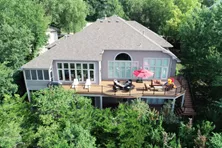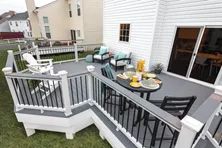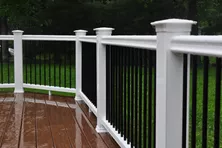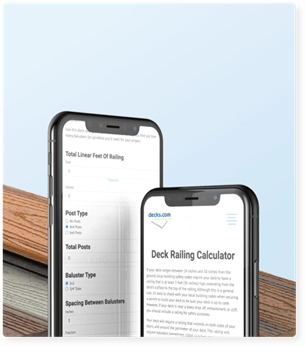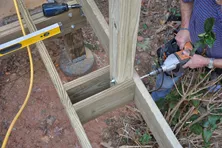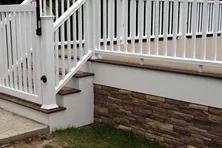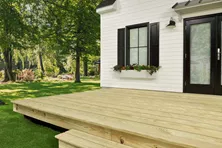Deck Railing Height Requirements
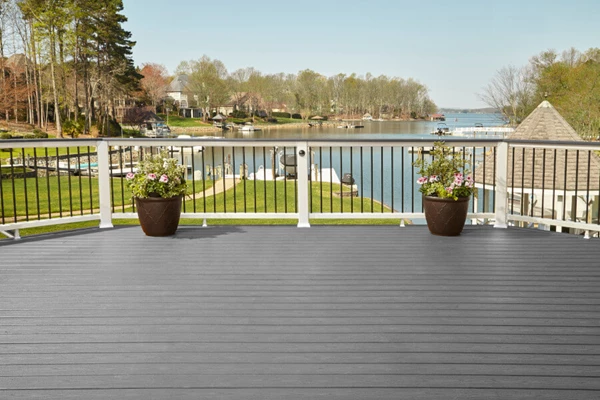
Building, replacing, or repairing your own deck makes for a great DIY project. Depending on the type of decking you use and whether you need to rebuild any of the underlying structures, installing a deck can be suitable for DIYers of all skill levels.
Whether this is your first or your fiftieth home building project, it’s key that you meet all code requirements for the municipality you live in. Learn essential deck railing safety ideas.
What is the Maximum Height of a Deck Without Railing?
Generally, decks under 30” in height do not require railings in most municipalities, but it's important to check local guidelines for specific regulations. If you add a railing to any deck, you must follow standard height and load-bearing requirements.
Decks 30” off the ground must have guardrails that meet both load-bearing and height requirements as specified by local building codes.
What is the best height for a deck railing?
The best rail height for a deck depends on how you intend to use your deck, where your home or business is located, and your local building code.
There are minimum heights for residential and commercial deck guardrails that must be adhered to. For a residential property, the required rail height is 36” and for commercial or multifamily properties it’s 42”. If you want a higher railing on a residential deck, going up to 42” is possible as materials are already designed to safely support a railing of this height.
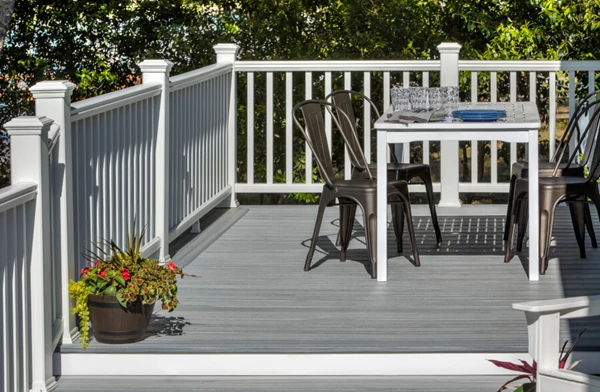
Residential Deck Railing Requirements
Decks built onto single-family homes must adhere to the International Residential Code (IRC). The IRC requires a minimum 36” height for all guardrails, but states and even local municipalities have their own deck railing height requirements too.
Even if your deck doesn’t require a guardrail, once you build a railing you must meet railing requirements. Regardless of the specific height requirements, a railing should always be measured from the deck surface to the top of the rail.
Measure from the deck floor to the top of the rail between posts. This must be at least 36" high to meet IRC requirements. Make sure your sweep space and all infill openings will not allow a 4" sphere to pass through.
Commercial Deck Railing Requirements
Building codes require stair handrails to be positioned between 34 and 38 inches above the tread nosing and comply with gripping surface requirements. Circular handrails should have an outside diameter between 1-1/4 and 2 inches. There must also be at least 1-1/2 inches of clearance between the handrail and the guardrail or wall.
What is the maximum height of a handrail on a deck?
You are allowed to build taller guardrails than IBC, IRC, or local building codes, as long as they conform to all other railing requirements for decks stated in the code.
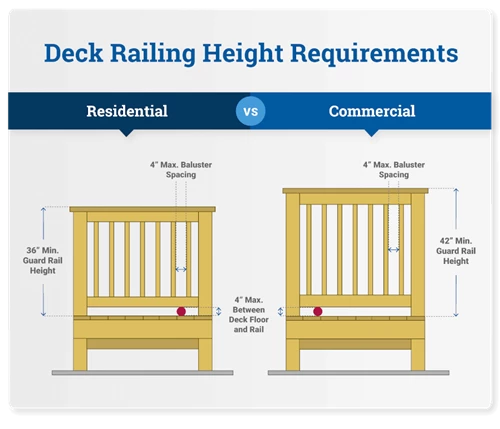
Do Deck Stairs Need Railings?
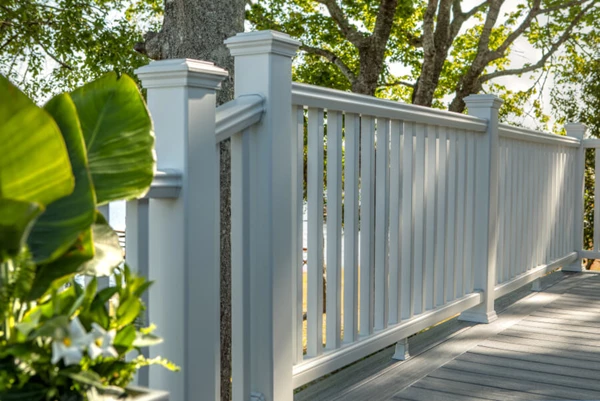
Do you need railings for stairs that lead to and from a deck? The short answer is yes, if your deck is high enough to require a guardrail and has stairs, those stairs need railings too. Deck stair guardrails should be between 34” and 38” according to IRC rules. Always measure vertically from the nose of the stair tread to the top of the railing.
Sweep Space Bottom Deck Rails
This popular rail style leaves a 4” space below the bottom rail to allow for snow, dirt, and any other debris to be swept off your deck surface. Rail posts are attached to the deck frame and support the infill sections. Rail posts need to be properly fastened and should not be spaced more than about 8 feet apart, though contractors usually aim for 6’ to avoid sagging and bouncing. Railing can come in both 8' and 6' sections. Purchase what works for your space.
Many builders run a 1x6 cocktail rail continuously over the top of the posts and top rail to provide a clean finished edge. This also offers a surface on which to set down glasses, etc. The pickets can be considerably shorter because they don’t need to be individually attached to the deck rim and they are raised off the floor. Most deck builders prefer this rail type due to its relative simplicity and functionality.
Learn More About Deck Railings
Deck railing height requirements are the tip of the iceberg when it comes to understanding how to build a deck to code. Additionally, you need to understand deck railing height codes and requirements whether you’re a DIY deck builder or hiring a contractor to build for you.
If you’re putting your deck together yourself, you’ll also need to understand the parts of a wood or composite deck railing well as teaching yourself a little more about how to install deck stair railings.
Again, remember to check your local building code to make sure you’re up to the requirements of your municipality. And of course, the best DIY advice in the book stands for decks too: measure twice and cut once!
Glass Deck Railing Ideas and DIY Installation Tips
All glass panels used for deck railings must be safety-tempered and shatter-resistant. Learn how to install glass railing panels and get ideas for your deck.
Cocktail Railing Considerations & Ideas
A cocktail rail is the ideal enhancement for a deck railing. Explore what to consider when introducing a drink rail to your deck.
How to Install Composite Deck & Porch Railings
Composite deck and porch railings offer a low-maintenance option for railings. Learn how to install composite railing and get ideas for your deck at Decks.com.
Deck Skirting
Skirting can be an attractive feature that can be added to any low-level deck.
5 Best Ways on How to Hide Trash Cans Outside
Outdoor trash cans can be an unwanted eyesore. Discover how you can easily cover them up and add an extra touch of beauty to your yard.
How To Install Deck Lighting
Step-by-step instructions on how to install low-voltage post cap lights. Learn about cutting a groove to hide your wiring.
More Helpful Resources
Explore Articles by Topic

Footings
Information related to installing frost footings for decks
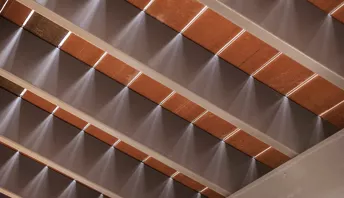
Framing
Learn structural framing methods
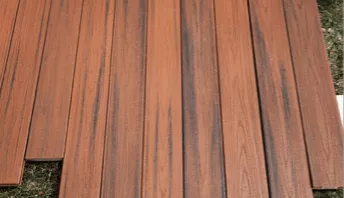
Decking
Learn about wood and composite decking materials
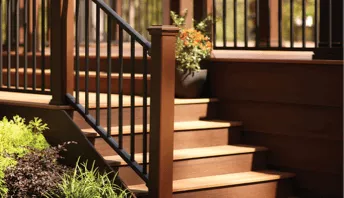
Stairs
An in-depth look at the complex issue of how to build stairs
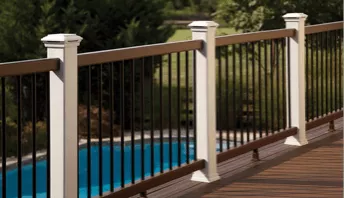
Railings
How to install guardrails and handrails to meet IRC code
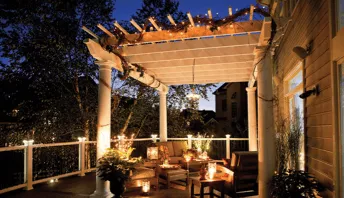
Features
An overview on water drainage, benches, planters and lights
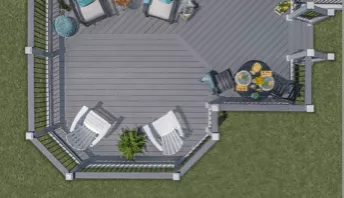
Design
The basics of deck design
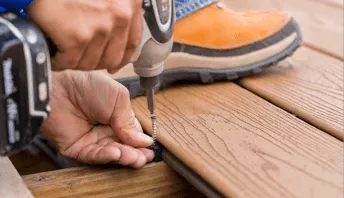
Planning
Learn about permits and working with contractors
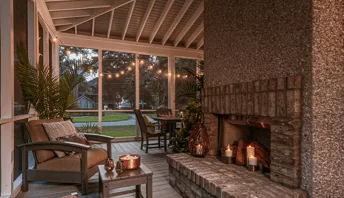
Porches & Patios
Build a covered deck to enjoy all seasons
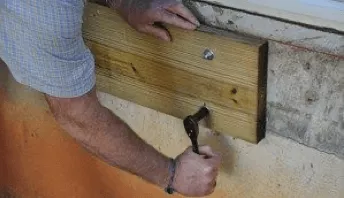
Ledger
Proper attachment techniques
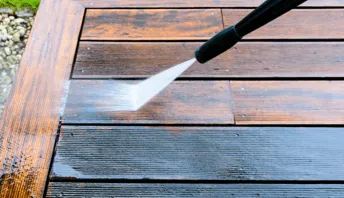
Care
Maintain your deck to maintain your investment

Materials
An overview on water drainage, benches, planters and lights
Deck Railing Safety for the Whole Family
Make your deck safe for everyone who uses it. Follow this expert advice on deck railing installation, maintenance and safety features to prevent falls and hazards
Attaching Rail Posts
Step-by-step instructions for installing rail posts to your deck frame.
How to Build & Install an Outdoor Deck Gate
In this easy-to-follow guide, we explain the process of building a deck gate and installing it on your deck.
5 Best Ways on How to Hide Trash Cans Outside
Outdoor trash cans can be an unwanted eyesore. Discover how you can easily cover them up and add an extra touch of beauty to your yard.
Our Favorite Outdoor Deck Lighting Ideas
Brighten up your outdoor living space and learn how to incorporate lighting fixtures into your deck to enhance your entertainment area.
Deck Stain Color Ideas & Inspiration
Choosing a stain color for your deck can feel overwhelming. Get inspired with deck stain color ideas and options.
Explore Articles by Topic

Footings
Information related to installing frost footings for decks

Framing
Learn structural framing methods

Decking
Learn about wood and composite decking materials

Stairs
An in-depth look at the complex issue of how to build stairs

Railings
How to install guardrails and handrails to meet IRC code

Features
An overview on water drainage, benches, planters and lights

Design
The basics of deck design

Planning
Learn about permits and working with contractors

Porches & Patios
Build a covered deck to enjoy all seasons

Ledger
Proper attachment techniques

Care
Maintain your deck to maintain your investment

Materials
An overview on water drainage, benches, planters and lights




